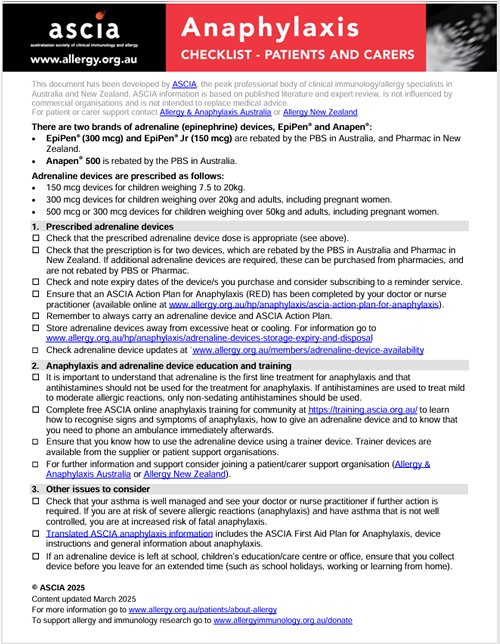Anaphylaxis Checklist - Patients and Carers
![]() ASCIA PC Checklist Anaphylaxis 2025141.03 KB
ASCIA PC Checklist Anaphylaxis 2025141.03 KB
This document has been developed by ASCIA, the peak professional body of clinical immunology/allergy specialists in Australia and New Zealand. ASCIA information is based on published literature and expert review, is not influenced by commercial organisations and is not intended to replace medical advice. For patient or carer support contact Allergy & Anaphylaxis Australia or Allergy New Zealand.
 There are two brands of adrenaline (epinephrine) devices, EpiPen® and Anapen®:
There are two brands of adrenaline (epinephrine) devices, EpiPen® and Anapen®:
- EpiPen® (300 mcg) and EpiPen® Jr (150 mcg) are rebated by the PBS in Australia and Pharmac in New Zealand.
- Anapen® 500 is rebated by the PBS in Australia.
Adrenaline devices are prescribed as follows:
- 150 mcg devices for children weighing 7.5 to 20kg.
- 300 mcg devices for children weighing over 20kg and adults, including pregnant women.
- 500 mcg or 300 mcg devices for children weighing over 50kg and adults, including pregnant women.
1. Prescribed adrenaline devices
- Check that the prescribed adrenaline device dose is appropriate (see above).
- Check that the prescription is for two devices, which are rebated by the Pharmaceutical Benefits Scheme (PBS) in Australia and Pharmac in New Zealand. If additional adrenaline device/s are required, these can be purchased from pharmacies, and are not rebated by PBS or Pharmac.
- Check and note the expiry date of the device/s you purchase. and consider subscribing to a reminder service.
- Ensure that an ASCIA Action Plan for Anaphylaxis (RED) has been completed by your doctor or nurse practitioner (available online at www.allergy.org.au/hp/anaphylaxis/ascia-action-plan-for-anaphylaxis).
- Remember to always carry an adrenaline device and ASCIA Action Plan.
- Store adrenaline devices away from excessive heat or cooling. For information go to www.allergy.org.au/hp/anaphylaxis/adrenaline-devices-storage-expiry-and-disposal
- Check adrenaline devices updates at www.allergy.org.au/members/adrenaline-device-availability
2. Anaphylaxis and adrenaline device education and training
- It is important to understand that adrenaline is the first line treatment for anaphylaxis and that antihistamines should not be used for the treatment for anaphylaxis. If antihistamines are used to treat mild to moderate allergic reactions, only non-sedating antihistamines should be used.
- Complete free ASCIA online anaphylaxis training for community at https://training.ascia.org.au/ to learn how to recognise signs and symptoms of anaphylaxis, how to give an adrenaline device and to know that you need to phone an ambulance immediately afterwards.
- Ensure that you know how to use an adrenaline device using a trainer device. Trainer devices are available from the supplier or patient/carer support organisations.
- For further information and support consider joining a patient/carer support organisation (Allergy & Anaphylaxis Australia or Allergy New Zealand).
3. Other issues to consider
- Check that your asthma is well managed and see your doctor or nurse practitioner if further action is required. If you are at risk of severe allergic reactions (anaphylaxis) and have asthma that is not well controlled, you are at increased risk of fatal anaphylaxis.
- Translated ASCIA anaphylaxis information includes the ASCIA First Aid Plan for Anaphylaxis, adrenaline device instructions and general information about anaphylaxis.
- If you have left an adrenaline device at school, children’s education/care centre or office, ensure that you collect the device before you leave for an extended time (such as school holidays, working or learning from home).
© ASCIA 2025
Content updated March 2025
For more information go to www.allergy.org.au/patients/about-allergy
To support allergy and immunology research go to www.allergyimmunology.org.au/donate
